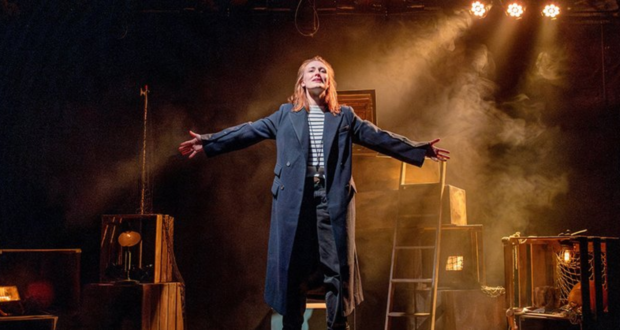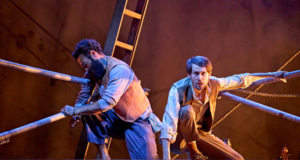A remarkable touching play that faces a challenging theme with nuance and optimismSummary
Rating
It’s hard for plays to hit the right balance when talking about mental health. Often, depictions of mental illness are cliché, akin to a GCSE drama performance, or saccharine, telling us that the answer to it all is love, actually. Sometimes they’re preachy, sometimes they’re belittling, and rarely do they actually have anything worthwhile to say. The Light House, from Alys Williams, manages to avoid these pitfalls with impressive dexterity.
After an introduction familiarising us with the procedures onboard a ship when a crew member goes overboard, the structure of which is referred to throughout the play, The Light House tells the autobiographical tale of Alys’s relationship with her partner, Nathan. At first, it’s a bundle of romantic tropes; they’re neighbours, they drift apart before finding each other again, and as their friendship develops so do their feelings for one another. Just when it’s starting to feel like the final act of a romcom, though, the unthinkable happens. Alys gets a call; Nathan’s in hospital. He’s tried to kill himself.
From this point, the sweet friends-to-lovers story becomes a far darker exploration of Alys’s experience of caring for a severely depressed partner. It’s an incredibly vulnerable piece. Williams never shies away from the painful realities of the situation, from desperately trying to stay afloat herself, a passage delivered in clown makeup and red nose, through the guilt of not being able to heal Nathan alone, to anger and despair at the lack of help available to those in desperate need of it.
That being said, The Light House doesn’t take itself too seriously. Reconstructions of Alys’s conversations with her sister and parents are delivered with a loving familiarity, and the failings of mental health services are both upsettingly true and dryly funny. Because really, why do in-patient mental health facilities insist on having such terrible motivational-poster-esque illustrations on their websites?
The warning of audience participation sends a wave of nervous energy through the room at the outset, but this is used admirably well. When so much of The Light House is about loneliness, about being lost in the dark, it’s a thematically appropriate choice, and one that’s not used to excess. Instead, you feel closer not just to Alys and her story but to those around you, fellow audience members who no doubt have their own connections to the play’s themes.
The set and lighting design are complex for such a small space. The slightly ramshackle construction of boxes, nets and lights transform into any number of settings for Alys to tell her story. Emma Williams’ design has been carefully thought out, with each element feeling purposeful and deliberate. The subtly nautical edge to Alys’ costume (striped jumper, big boots) is effective too, leaning just the right amount into the titular theme without going, pardon the pun, overboard.
Matthew Carnazza’s lighting transforms the space, using movement and a range of set-ups to enhance the on-stage events without ever being intrusive. The use of an angle-poise, dimmable desk lamp to ‘play’ Nathan is innovative and effective; the cast and crew manage to get a lot of character out of an inanimate object, something the lighting plays a key role in.
The play does feels a little over-acted at times, with everything turned up to 11. That being said, it’s difficult not to be affected by the genuineness behind it; although far from naturalistic, the emotions, motivations and overall message of the piece are never in doubt. This is a story of hope, of getting the light to outweigh the dark even when it feels impossible.
“There’s one thing you should know. It’s all going to be okay” Alys says. By the end of the play, that feels believable.
Written by: Alys Williams
Directed by: Andrea Heaton
Produced by: Rachael Halliwell
Sound design by: Ed Heaton
Movement direction by: Maya Carroll
Set design by: Emma Williams
Lighting design by: Matthew Carnazza
The Light House plays at Park Theatre as part of their Make Mine A Double season until 13 April. Further information and bookings can be found here.
 Everything Theatre Reviews, interviews and news for theatre lovers, London and beyond
Everything Theatre Reviews, interviews and news for theatre lovers, London and beyond



